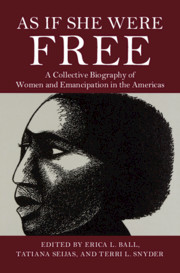Book contents
- As If She Were Free
- As If She Were Free
- Copyright page
- Dedication
- Contents
- Figures
- Contributors
- Elizabeth Catlett and the Form of Emancipation
- Acknowledgments
- Introduction
- Part I Claiming Emancipation during the Rise of New World Slavery
- 1 Margarita de Sossa, Sixteenth-Century Puebla de los Ángeles, New Spain (Mexico)
- 2 Paula de Eguiluz, Seventeenth-Century Puerto Rico, Cuba, and New Granada (Colombia)
- 3 Reytory Angola, Seventeenth-Century Manhattan (US)
- 4 Elizabeth Key, Seventeenth-Century Virginia (US)
- 5 Hannah Manena McKenney, Late Seventeenth- and Early Eighteenth-Century Bermuda and New Providence (Bahamas)
- 6 Juana de Godinez, Seventeenth-Century Lima (Peru)
- Part II Experiencing Freedom during Slavery’s Expansion
- Part III Envisaging Emancipation during Second Slavery
- Part IV Enacting Emancipation in the Aftermath of Slavery
- Bibliography
- Index
2 - Paula de Eguiluz, Seventeenth-Century Puerto Rico, Cuba, and New Granada (Colombia)
from Part I - Claiming Emancipation during the Rise of New World Slavery
Published online by Cambridge University Press: 24 September 2020
- As If She Were Free
- As If She Were Free
- Copyright page
- Dedication
- Contents
- Figures
- Contributors
- Elizabeth Catlett and the Form of Emancipation
- Acknowledgments
- Introduction
- Part I Claiming Emancipation during the Rise of New World Slavery
- 1 Margarita de Sossa, Sixteenth-Century Puebla de los Ángeles, New Spain (Mexico)
- 2 Paula de Eguiluz, Seventeenth-Century Puerto Rico, Cuba, and New Granada (Colombia)
- 3 Reytory Angola, Seventeenth-Century Manhattan (US)
- 4 Elizabeth Key, Seventeenth-Century Virginia (US)
- 5 Hannah Manena McKenney, Late Seventeenth- and Early Eighteenth-Century Bermuda and New Providence (Bahamas)
- 6 Juana de Godinez, Seventeenth-Century Lima (Peru)
- Part II Experiencing Freedom during Slavery’s Expansion
- Part III Envisaging Emancipation during Second Slavery
- Part IV Enacting Emancipation in the Aftermath of Slavery
- Bibliography
- Index
Summary
Paula de Eguiluz, the daughter of African slaves in Puerto Rico in the 1590s, achieved her freedom from slavery by age thirty. However, from the 1620s to the end of the 1630s, she fought a contentious, ongoing battle with the inquisitors working out of the Cartagena de Indias tribunal of the Spanish Holy Office. Eguiluz gave numerous testimonies to the inquisitors, which hostile and friendly witnesses filled in from their own experiences with her. This extensive documentation offers a biographical narrative overflowing with details that have intrigued historians since the nineteenth century including: her infamous powers of seduction, her bold and elegant appearance, her healing skills, her ability to fly, and her frightening arsenal of incantations and potions. Eguiluz’s fortunes rose and fell in the first half of the seventeenth century, but what is most noteworthy is her dedication to the struggle for freedom. Through analysis of her detailed autobiography presented to the inquisitors and the supporting biographic details provided by her acquaintances and rivals, Eguiluz emerges as a complicated heroine with documented emotional subjectivity and moral ambiguity.
- Type
- Chapter
- Information
- As If She Were FreeA Collective Biography of Women and Emancipation in the Americas, pp. 43 - 57Publisher: Cambridge University PressPrint publication year: 2020

